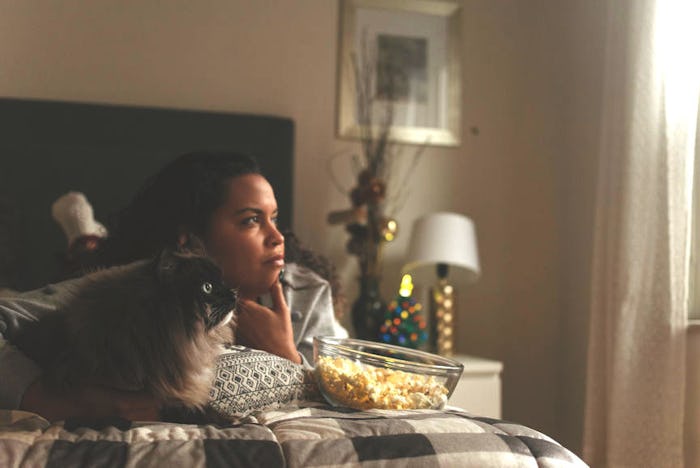Life

You Should Definitely Eat These Super Healthy Foods, But Not At Bedtime
Eating nutritious foods makes you feel physically and mentally great... most of the time, at least. It's one of nature's most frustrating ironies that some foods which are normally good for you can have the opposite effect. For instance, nuts, milk, and strawberries are loaded with vitamins, but for people with food allergies, they're a ticket to the emergency room. There are also certain healthy foods that can disrupt your sleep, oddly enough. You may think you're doing your body a favor at dinnertime, only to toss and turn for hours or stay up with unpleasant digestive symptoms.
Some of your favorite meals or bedtime snacks can help you fall asleep, such as milk, bananas, or crackers and cheese, according to WebMD. They contain snooze-inducing substances, such as tryptophan, that allow you to wind down more easily. But other foods are best avoided too close to bedtime, such as meat or fried foods, which are difficult to digest. Alcohol may make you drowsy, but it also lowers the quality of your sleep once you do drop off. Spicy dinners may keep you up at night with heartburn, and a post-dinner coffee is probably a bad idea, too.
No big surprises there, but there are also a number of snooze-compromising foods that you might not associate with poor sleep. They're not especially rich or spicy, and they often appear on nutritionists' lists of healthy eats. But all the same, they can keep you up at night because of their chemical makeup. If you're prone to insomnia, try cutting back on these foods at night. (But feel free to indulge earlier in the day!)
1Watermelon
The summer picnic staple is a terrific dessert, since it packs a lot of vitamins for a minimum of calories (just 46 per cup). But its high water content can mess with your sleep by sending you to the bathroom in the middle of the night. Same goes for other water-rich fruits and veggies such as celery and cucumbers, explained AARP.
2Eggplant
Love eggplant parmigiana? Eat it early in the evening, rather than a late-night meal. The purple veggie contains vitamins C and K, magnesium, folic acid, potassium, and fiber, and may support bone health and brain function. However, it also contains the amino acid tyramine, which signals the brain to release the stay-awake neurotransmitter norepinephrine, added AARP. Tomatoes are also high in tyramine, so that tomato sauce on the eggplant parmigiana isn't doing you any favors sleep-wise, either.
3Oranges
These sweet juice bombs are rich in vitamin C and fiber, making them a super way to start your morning. Before bed, however, is another story. The high acid content of citrus fruits like oranges and grapefruit can keep you awake if you suffer from gastroesophageal reflux disease, explained WebMD. The acidity of the foods contributes to heartburn, which gets worse when you lie down.
4Coconut Oil
It may be the health food world's current darling as far as good fats are concerned — there's evidence coconut oil can help with weight loss, memory, and heart health, and even kill bacteria — but it's not such a good friend too close to bedtime. A study published in the Journal of Sleep Research found that a number of nutrients were associated with difficulty falling asleep. Among them: hexadecanoic acid, which is found in coconut oil.
5Pumpkin
Everyone's favorite autumn squash is a nutrition powerhouse. Unfortunately, one of the nutrients that makes it so great — alpha-carotene — is another of the ones cited in the journal study as interfering with the ability to catch your z's. (Better hold off on that second slice of pumpkin pie on Thanksgiving.)
6Dark Chocolate
Dessert lovers often feel justified having a square or two of dark chocolate at night, since its plant compounds have been linked to better heart and brain health. However, as SF Gate pointed out, the more cocoa solids chocolate has, the higher it is in caffeine. While the amount is considerably less than in a cup of coffee — 25 milligrams, compared to 95 for a cup of joe — it can still wreak havoc with your sleep if you're sensitive to caffeine.
7Beans
Those favorite add-ins to your chili and quesadilla are packed with protein and fiber. But they're also high in a complex sugar known as oligosaccharides, which the human body can't easily digest. As a result, the sugar sits and ferments in the lower intestine, causing production of those famous gases which... well, you know. To prevent an uncomfortable night, eat your bean dishes earlier in the day. Or try these tips to make beans more digestible, from the Nourishing Days website: Soak dried beans for at least 48 hours, changing the water frequently. Then use an extended cooking method, such as simmering them in a vegetable stock or using a slow cooker.
This article was originally published on